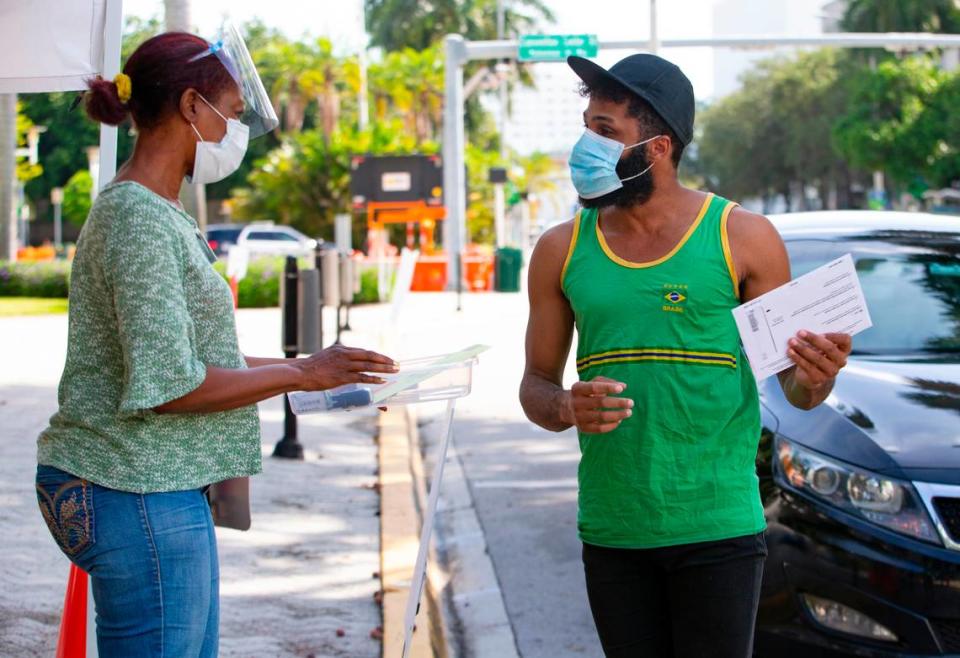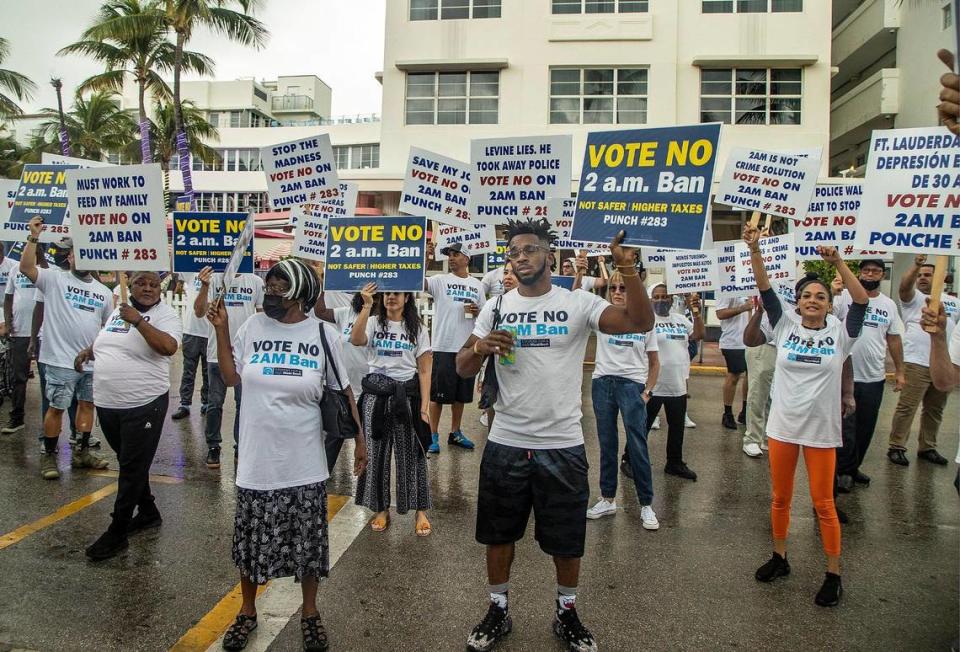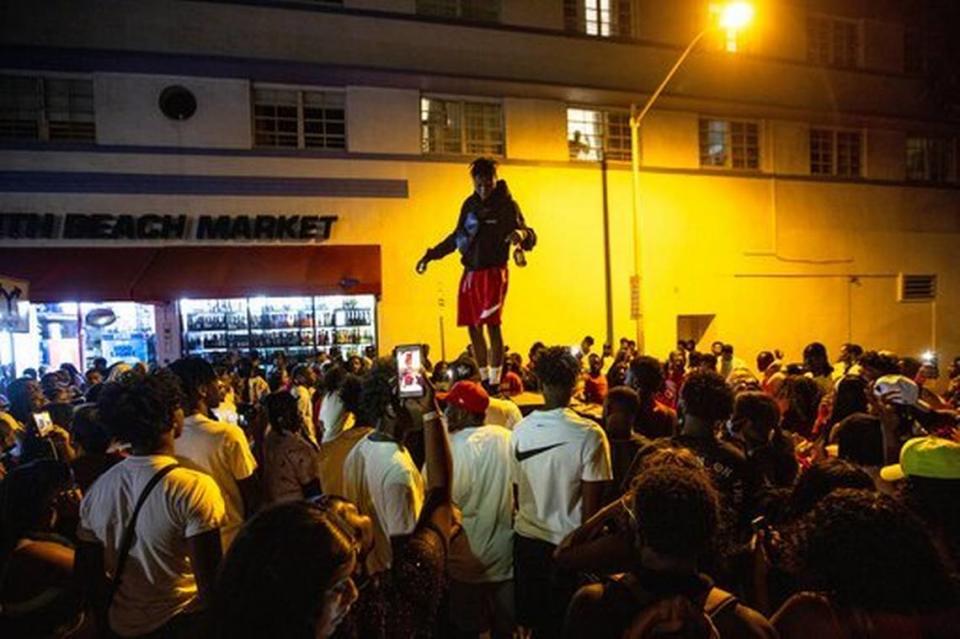Paid protesters? A $300K referendum? Questionable claims in Miami Beach’s 2 a.m. fight
Paid protesters? Misleading endorsements? A $300,000 referendum redo?
In the debate over whether to limit early-morning alcohol sales on Miami Beach, the campaigns on either side of a contentious Nov. 2 referendum have accused the other of using half-truths or outright lies to get voters to support their position.
The attacks have heated up as the election draws closer and as voters begin to decide whether Miami Beach should ban alcohol sales after 2 a.m. citywide, with yet-undetermined exceptions.
The Miami Herald has compiled some of the questionable claims made by the two campaigns. The “Yes” campaign is associated with Mayor Dan Gelber and former Mayor Philip Levine, who view a 2 a.m. last call as a first step to repositioning South Beach as a “live, work, play” area rather than party central.
The “No” campaign is bankrolled by South Beach bar owners, who say an earlier last call won’t reduce crime and will cost the city millions in tax revenue.
This list is not comprehensive, but looks at a handful of claims both campaigns have made during the election.
The cost of the election
The campaign opposing the referendum, organized under the political committee Citizens for a Safe Miami Beach, has pointed out that voters rejected a similar 2 a.m. alcohol sales ban in 2017. The group has gone further, saying that holding another referendum is diverting money from the police department.
On its campaign website — under a tab labeled “Get the Facts” — the PAC claims that “to redo this referendum ... is costing us $300,000 to have it again.”
“This money could have been better used on more police officers, more officer training and additional resources for our police department. Enough is enough.”
It’s true that it will cost an estimated $349,000 for Miami Beach to hold the upcoming election. But the 2 a.m. referendum is expected to carry a much smaller price tag: $160.
That’s how much it costs to translate each ballot question into different languages, according to Miami-Dade Deputy Supervisor of Elections Suzy Trutie. The only other potential cost associated with ballot questions is the cost to print extra pages if they are needed to fit all the questions. But no extra pages are needed for Miami Beach’s election, she said.
“There aren’t any additional pages anticipated,” Trutie said in an interview. “It’s one page front and back.”

Citizens for a Safe Miami Beach spokesman Juan Peñalosa said the website’s statement was referencing the county’s estimate that it would cost more than $300,000 to hold the election. But the general election — mayor and commission races — would cost the same with or without ballot questions, Trutie said.
Were protesters paid?
After protesters disrupted a pro-2 a.m. press conference on Friday — drowning out Gelber, Levine and supporters of the referendum — the Yes campaign claimed that “paid agitators” were behind the demonstration.
When pressed for more information, Christian Ulvert, a spokesman for the political committee Yes for a Safer Miami Beach, said one of the protesters, whom he identified in a photo, told him she was being paid to attend.
“I asked her why she was there because she started following us ...,” Ulvert said. “She said, ‘What’s the problem if I’m paid to be here?’”
But when reached by the Herald, the protester in question, catering company owner Nicole Jury, said she was not paid to protest and did not tell Ulvert that she received any compensation to be there Friday.
“We were not paid,” she told the Herald. “That’s a lie.”
Ulvert, a political consultant who has represented both Gelber and Levine, also claimed that the protesters, some of whom worked for South Beach businesses like Mango’s Tropical Cafe, were being paid by their employer to protest. Gelber and Levine made similar claims about the protesters being paid. Levine called the group a “rent-a-mob.”

The No campaign released a statement after the protest approved by nearly a dozen hospitality workers who attended the protest and said they were not “paid actors.”
”We are workers fighting for our jobs,” the statement reads.
Jessica Francos, the vice president of operations for the Clevelander’s parent company Jesta Hotels, told the Miami Herald that none of the Clevelander’s workers were paid or forced to attend the protest.
“They were all volunteers,” she said in an email.
Who is endorsing the 2 a.m. referendum?
In the war for public opinion, both campaigns have used endorsements from community figures to show voters who is on their side. In some cases, the campaigns have featured the same community leaders in their political ads — which has led to claims of deception from both sides.
Miami Beach Police Lt. Paul Ozaeta, who told the Herald he personally supports the 2 a.m. referendum, was featured in an anti-2 a.m. campaign ad on Facebook earlier this month. Beneath his photo and a quote about traffic on Ocean Drive, the No PAC asked the public to “Vote No” on the 2 a.m. referendum. He said he didn’t approve being used in the ad, which he said may lead voters to believe he is against the referendum.
Ozaeta, the president of Miami Beach’s Fraternal Order of Police, was later featured in a pro-2 a.m. campaign ad endorsing the referendum, which he said he did approve. While he said he personally supports the 2 a.m. referendum, Ozaeta released a statement on union letterhead last week seeking to set the record straight after both campaigns had used his name and photo in their ads.
But the statement seems to have only caused more confusion. In it, Ozaeta wrote that the union “has taken no official position on this issue” and that the executive board had not approved any statements endorsing either side.
He told the Herald his statement was meant to clarify that his views don’t represent the union or its members. But it has been interpreted by at least one news outlet to mean Ozaeta does not support the referendum.
“It’s a fix for what I hope is a temporary problem,” Ozaeta said of the 2 a.m. booze ban.
Gelber said it was “misleading” for the opposing campaign to use Ozaeta’s quote in its ad and said his campaign has been “pretty straight” about its endorsements.
“Paul approved it, we’ve checked with everybody,” Gelber said.
At the same time, the No PAC criticized the opposing campaign for claiming to have the endorsement of Miami Beach Police as a whole.
The .@MiamiBeachPD agree with 2AM!!!! YES to 2AM!!! @MiamiBeachNews @martindvassolo @RE_MiamiBeach pic.twitter.com/iizfUJ8M1d
— Mayor Philip Levine (@MayorLevine) October 18, 2021
After Ozaeta endorsed the 2 a.m. referendum, Levine tagged the Miami Beach Police Department on Twitter and said “The @MiamiBeachPD” support the referendum, alongside Ozaeta’s photo. The campaign also sent the endorsement to voters via text, writing that “Miami Beach Police Say YES to 2 a.m.”
Ulvert said the campaign text was accurate because it does not claim the entire department supports the referendum.
“We didn’t say 100% of the officers,” he said. “We said Miami Beach Police.”
Ozaeta said it would be “inaccurate” to say his endorsement represents any organization or agency, and said the Miami Beach Police Department does not take sides when it comes to politics. He said it’s clear both campaigns wanted his endorsement, but he encouraged voters to ignore the endorsements altogether and do independent research before voting.
“I don’t want to be involved in any more muckraking or whatever,” he said.
Both campaigns have also claimed former Mayor Matti Bower as being on their side of the debate.
The Yes campaign featured Bower in a campaign mailer earlier this month endorsing the 2 a.m. referendum, but she later appeared in a video for the anti-2 a.m. PAC opposing the earlier alcohol-sales cutoff. The No PAC posted the video on social media and said the Yes campaign was “deceiving” voters, while Gelber said Bower approved the ad.
Bower said a “misunderstanding” and some “misinformation” was to blame for the mix-up. She said she told Gelber at a luncheon that she supported the 2 a.m. referendum but later changed her mind after studying it further.
She told the Herald she would support a blanket 2 a.m. ban, but not one that allows the City Commission to dole out exemptions to certain types of businesses like hotels.
Gelber later texted Bower a photo of the double-sided mailer that featured her photo on the front and arguments for the 2 a.m. ban on the back. But Bower said she had technical difficulties with her phone and could not see the front of the mailer with her photo. She said she didn’t know her face would be printed alongside Gelber’s and Levine’s in an ad supporting a 2 a.m. rollback. When she and Gelber spoke afterwards, she gave Gelber suggested edits for the backside of the mailer. But she does not recall him asking her if it was OK to print her photo and list her as an endorser.
“I think there was a little bit of misinformation and I didn’t realize it was going to be sent out,” Bower said. “I don’t think they did it in bad faith.”
She said she was upset when she saw the mailer, and filmed the anti-2 a.m. video shortly after. It wasn’t until about a week later that Bower realized Gelber did send her the full mailer.
“I can’t blame him, it was my fault,” Bower said. “I can’t blame somebody for me not being able to pick that thing up. Maybe he could have talked to me more about it ... but that wasn’t up to him. I should have been maybe more careful. I just never thought he would send something with my picture.”
Gelber said Bower approved what he texted her.
“She approved exactly what we did and we make exactly the changes she asked for,” Gelber said. “I texted her the thing so she could see it.”
Peñalosa said it was “dishonest” for the Yes campaign to put Bower on the mailer.
“If you were going to say Miami Beach mayors agree [on the referendum] you better make sure they all agree,” he told the Herald. “And you better have proof they all agree.”
Was crime ‘worse’ during COVID curfew?
The No campaign and its supporters have claimed that crime worsened during the midnight COVID curfew imposed by Miami-Dade County, which lasted from July 2020 to April 2021. But they offer no supporting data.
Former U.S. Rep. Joe Garcia, who is doing public relations work for the anti-2 a.m. PAC, said at a recent community meeting that crime was worse during the midnight curfew.
“When crime was worse on the Beach, this is statistically correct, was when they had a 12 a.m. curfew, which was during the pandemic,” Garcia said.
Mango’s owner David Wallack, who has been the most vocal leader of the No campaign, said at a City Hall protest earlier this month that “crime soared” in 2020 when businesses were shuttered due to COVID closures.
On its website, the group wrote, “In response to COVID, Miami Beach implemented curfews and closures of bars, clubs and restaurants — and banned alcohol sales after midnight. Curfews did nothing to stop rampant crime or illegal street partying. In fact, crime got worse.”

Crime data that Miami Beach Police provided to the FBI show that violent crime and arrests decreased citywide in 2020, an outlier that law enforcement experts said was caused by the pandemic. Crime and arrests shot back up during the first six months of 2021, according to the data.
The No campaign did not provide crime statistics to show that crime increased amid the COVID-era curfew. Peñalosa cited news stories from last March’s chaotic spring break that he said shows curfews did not reduce crime.
“We have many news stories that cite violent crime during this period,” he wrote in an email. “Also, this is one of the areas that both the Yes and No campaigns agree on — that crime has increased, and I’m open to hearing any argument from police, residents or the city saying that the curfew and the roving mobs that ensued actually decreased crime.”

